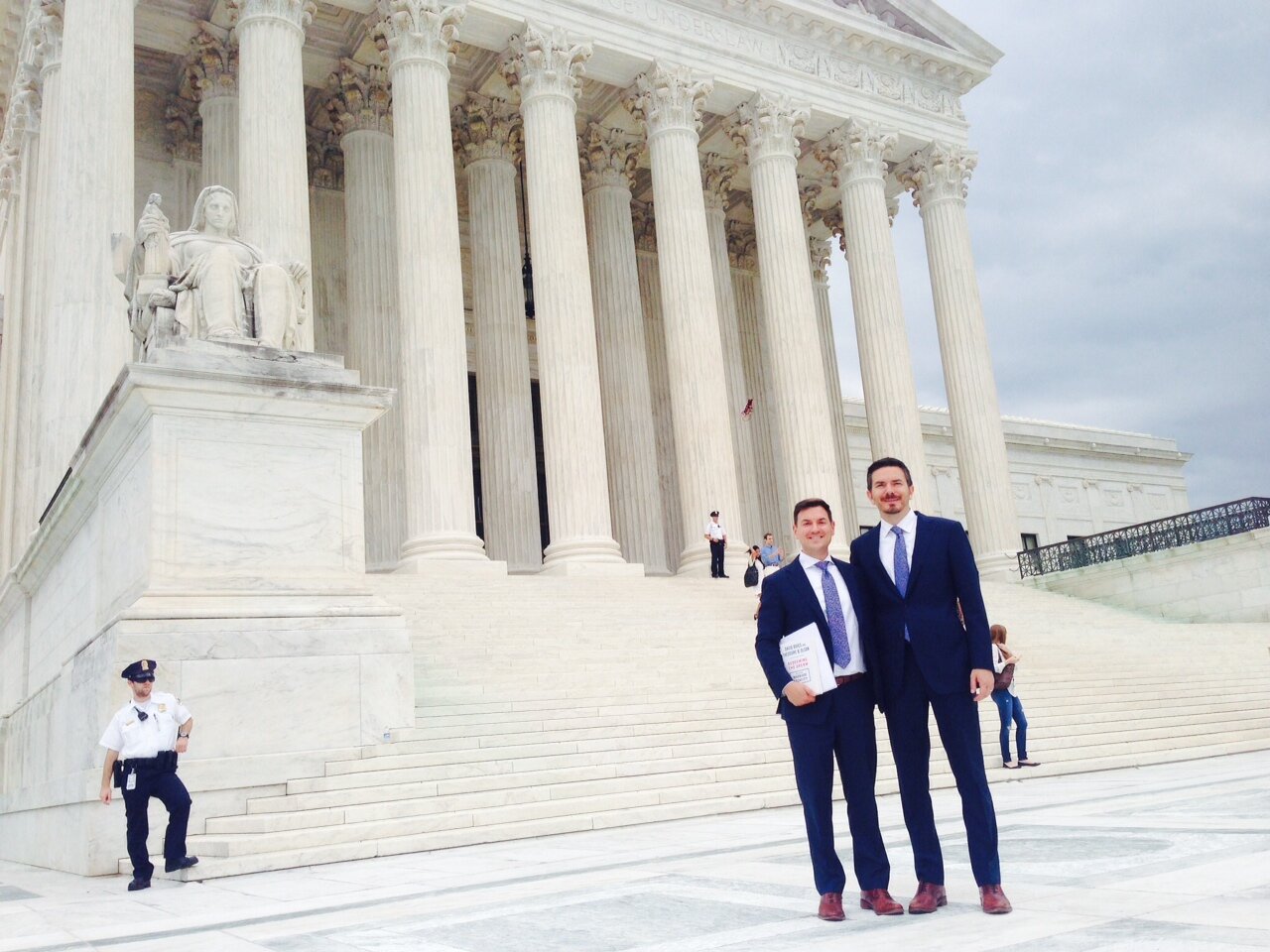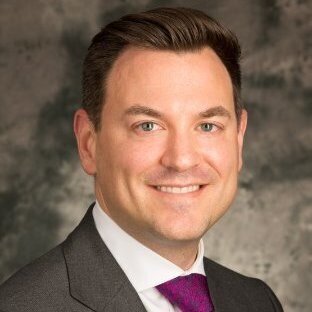From Inside the Court: My Firsthand Account of the Marriage Equality Ruling
Six years ago in June, my husband and I woke up anxious but full of hope. It was Friday June 26th, 2015, and we had been invited to the Supreme Court to hear the Justices’ opinion read in person.
We rushed out of the house in the same suits we were married in two years prior (in Iowa, one of the few states to recognize marriage equality). We dropped our daughter, Cora Lucia, with a neighbor and took a car to the Court. Hundreds of activists had gathered on the grounds outside the Court and a sea of Human Rights Campaign flags filled the sky. My husband and I carried with us a copy of “Redeeming The Dream, The Case for Marriage Equality” by the great Supreme Court litigators David Boies and former Solicitor General, Theodore B. Olson who had written a note to our daughter on the first page.
The energy in the gallery was unmistakable and the Supreme Court Police had to reprimand those in the room several times to lower their voices. At exactly 10:00AM, the clock above the seats of the Justices buzzed. Police officers raised their arms in unison as the Marshal of the Supreme Court banged her gavel and we stood up. The Marshal declared; "The Honorable, the Chief Justice and the Associate Justices of the Supreme Court of the United States. Oyez! Oyez! Oyez! All persons having business before the Honorable, the Supreme Court of the United States, are admonished to draw near and give their attention, for the Court is now sitting. God save the United States and this Honorable Court!”
A copy of the majority opinion, signed by its author, Justice Kennedy.
Justice Kennedy walked in with a purposeful look, papers in hand. Maybe it was wishful thinking, but the more conservative justices’ body language appeared telling. As Justice Kennedy began to read the landmark decision, Justice Scalia, placed his head in his left hand and looked into the distance. Justice Thomas placed his head into both hands looking down at the bench before him. As Kennedy read further, they became increasingly detached, while the more liberal justices intently watched the reaction of the attendees. Chief Justice Roberts’ face remained stoic and Justice Alito seemed reluctant to look away from the bench.
All attendee attention was locked on Justice Kennedy as he approached the apex of the opinion, finally saying; “This analysis compels the conclusion that same-sex couples may exercise the right to marry.”
The attendees let out an audible gasp. Tears of joy trickled down several faces near us as many attempted to grasp the announcement and contain their joy. At that exact moment, it truly hit us that history had been made. A lightness entered the room as this significance and permanency of the ruling settled in. At that moment, only the persons in the Chambers knew that the rights of millions were finally realized and secured under the U.S. Constitution. Soon, the whole world would know.
As gay men who came of age in the 80’s and 90’s, we understood too-well the emotional, and at times, violent physical consequences of being seen as different and less-than. At that moment, we were equal under the law. No longer could we be denied the benefits that the States had linked to marriage. Over the past several years we had been forced to put great effort and financial resources behind the planning of our family to secure as many legal rights as possible. We labored in excruciating detail through the web of known and unknown rules and rights, in a variety of state and local jurisdictions relating to marriage, surrogacy, adoption, taxation and inheritance. All in an effort to craft a legal reality that would still never fully afford the same protections provided others in society.
Furthermore, as parents, we did not want this legal burden or its stigma to impact our daughter. Now, we no longer had to be afraid that our child would suffer the shame of feeling that our family was somehow lesser under the law—that it was wrong to be different.
Justice Kennedy closed by saying:
No union is more profound than marriage, for it embodies the highest ideals of love, fidelity, devotion, sacrifice, and family. In forming a marital union, two people become something greater than once they were. As some of the petitioners in these cases demonstrate, marriage embodies a love that may endure even past death. It would misunderstand these men and women to say they disrespect the idea of marriage. Their plea is that they do respect it, respect it so deeply that they seek to find its fulfillment for themselves. Their hope is not to be condemned to live in loneliness, excluded from one of civilization’s oldest institutions. They ask for equal dignity in the eyes of the law. The Constitution grants them that right. The judgment of the Court of Appeals for the Sixth Circuit is reversed.
Marriage equality opponents attempted to persuade the Court that a favorable ruling would infringing on religious liberty. The majority of the Justices concluded however that the strength of our republic is rooted in the truth that fundamental rights are inherent to the individual. Government can only secure those rights, not take them away. The will of the majority, even if rendered after lawful results at the ballot box, can never infringe upon the rights of a minority. The five justices had applied the careful scrutiny demanded by the Fourteenth Amendment for equal protection of the laws and resolved that we were indeed equal. It was an incredible day for republican democracy.
After Chief Justice Roberts delivered his dissenting opinion from the bench, a strike of the gavel finalized the day. We filed out of the Court as a roar of excited cheers swelled from beyond the outside doors. We stood, atop the Supreme Court steps, beneath the towering marble columns, experiencing a moment that would become a defining chapter in our nation’s history.
My husband and I stand in front of the court on a fantastic day for us and the country.
Later, we toured the Justices’ Conference Room. Standing in the room where so many history-shaping, landmark cases had been debated, we were overwhelmed by the weight of history leading up to this moment. President Obama’s Rose garden address on the decision summed up our feelings at that moment perfectly:
“…today, we can say in no uncertain terms that we’ve made our union a little more perfect. That’s the consequence of a decision from the Supreme Court, but more importantly, it is a consequence of the countless small acts of courage of millions of people across decades who stood up, who came out, talked to parents, parents who loved their children no matter what, folks who were willing to endure bullying and taunts, and stayed strong, and came to believe in themselves and who they were. And slowly made an entire country realize that love is love.”
We feel honored and humbled to have witnessed this life changing ruling. More importantly, we will be forever deeply grateful to the thousands of passionate advocates who fought to make this dream a reality on our behalf. So many brave men and women had done more than their part to advance equal rights under the law and had finally achieved that goal. Many others had not lived to celebrate this day, but their sacrifices, their efforts, and the efforts of many others, had finally secured the rights of generations to come.
Patrick Forrest, PMAA Board Member and 2003 PMF, is an attorney, investor, and entrepreneur with experience at the National Association of Manufacturers, DHS, and Quest for Justice (where he is the Chief Strategy Officer), a technology company he co-founded developing software solutions for litigants unable to access legal help. Patrick was also a Senior Fellow at The George Washington University, held a Fulbright Research Chair for North America, served as a JAG officer, and was a HUD PMF.



